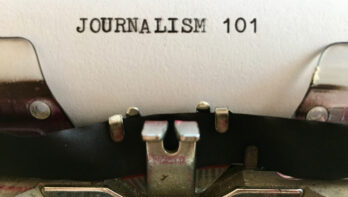Having started out in journalism in the days of big old desktop typewriters with sticky keys and triple carbon copies, I’m appreciative of the new tools that make the job easier. I’m just not so sure about some of the new titles.
True, in an age of multi-media skills, some of the lines have blurred between reporter, writer, copy editor, editor, and photographer. But what about when we’re not handling original material, only rehashing other people’s? There’s aggregator, accumulator, content provider, and curator.
For me, these are either too passive or too pretentious. They suggest a neutral, hands-off approach—“It’s not for us to decide whether this is important, but it sure drives a lot of traffic”—or an elitist attitude (“This canvas may look like it’s been painted by a three-year-old, but it’s actually by a grown man and worth millions for reasons you can’t possibly understand, so be impressed”).
I believe that those of us involved in journalism in whatever form need to reclaim an older title: gatekeeper. This has been used pejoratively at times, that’s true, but for Christian journalists it’s a term that is rich with spiritual symbolism and meaning.
In the same way the original gatekeepers sat on a city’s walls and controlled the flow of what came into their cities, that’s something of the role Christian journalists play for their communities today. It’s a responsibility that should be driven by more than clicks or condescension.
There’s a striking biblical example of the importance of gatekeepers in 2 Kings 7. Samaria has been under siege by the Syrians for some time and things are beginning to get desperate. People trapped within the city are famished, turning to cannibalism, when the prophet Elisha tells them not to worry. Tomorrow, he declares, there will be so much food that they won’t know what to do with it. Yeah, right, the people must be thinking.
But four lepers who have been sent outside the city because they are unclean decide that, rather than starve to death where they are, they might as well go over to the camp of the surrounding Syrians and beg for mercy. When they get there, lo and behold, they find the place deserted. God has caused the invaders to flee, leaving behind all their goodies.
The lepers start to grab gold and food, stuffing into their pockets and mouths, when one tells the others to hold on a minute. “We are not doing right,” he says (verse 9). “This is a day of good news.” So they go back to Samaria, and shout up to the gatekeepers, telling them what has happened.
“Then the gatekeepers called out, and it was told within the king’s household,” the account continues. Before too long, the famished Israelites are feasting—just as Elisha had said they would.
Gatekeeping is serious business: it shapes the lives of the people within the walls. It can facilitate the fulfillment of God’s prophetic word.
Not every decision of what to allow in will be as dramatic in its results, of course. But gatekeeping works on two levels.
Journalism can disciple people. Think about how the “bad report” (Numbers 14:37) brought back by ten of the 12 spies who went to scout out the Promised Land caused an entire nation to miss all that God had for them. The Israelites went off in the wrong direction for an entire generation because of what they were told and believed.
Don’t we see that happening in the world today; people following bad reports and going the wrong way as a result?
But even if the news media doesn’t change or shape your thinking, if you’re too thoughtful or aware to be swayed by someone else’s point of view, it has another, more subtle affect. It sets the agenda in the first place.
Ever wondered if the shooting, the city council member resigning over an affair, the road closed by an overturned truck transporting rubber ducks, and the cute puppy wearing a Santa hat really were the absolutely most important things that happened today in your local television news station’s market? Says who?
In other words, the news media tells us what to think about first, and then tries to tell us what to think about it.
That’s quite a responsibility.
In that 2 Kings scenario, the people were starving and the gatekeepers had a role in answering their cry. They were the hinge for his provision. People are hungry today; let’s not give them junk food or foie gras, but real meat. Let’s guard the gates.
— by Andy Butcher
EPA Associate member Andy Butcher is a freelance writer and reporter. He is a veteran magazine and newspaper editor with major stints as director of Youth With a Mission Press & Media Services, senior writer at Charisma magazine and editor of Christian Retailing magazine. He serves EPA as a contest judge and has also served on the board of directors.
This article appeared in the Fall 2016 issue of Liaison.





